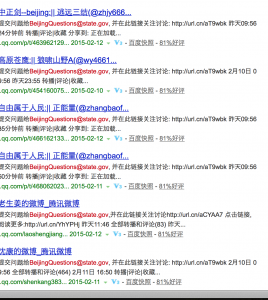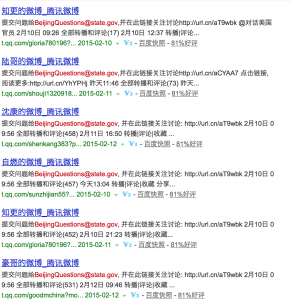A U.S. embassy Weibo chat on human rights was moved to Twitter after the Weibo account set up for the dialogue disappeared. Visitors to the embassy website were invited to submit questions to Tom Malinowski, Assistant Secretary of the Bureau of Democracy, Human Rights, and Labor, about the U.S.’s record in fulfilling United Nations human rights treaties. Malinowski planned to respond live on Weibo on February 13. But before the day came, his Weibo account had gone:
No my account wasn’t hacked-I just finished a chat w/ people in #China about how the US & others comply w/ human rights commitments (1of2)
— Tom Malinowski (@Malinowski) February 13, 2015
Tried to do it on #Weibo but looks like Internet police got there 1st. Info can be slowed, not stopped. Look forward to more of these (2of2)
— Tom Malinowski (@Malinowski) February 13, 2015
Questions ranged from campaign financing issues and human rights abuses in the U.S., to the universality of human rights, as well as appeals for the U.S. to monitor the imprisonment and abuse of human rights advocates in Chinese such as Gao Zhisheng, Pu Zhiqiang, and Ilham Tohti. Questions submitted by email or Weibo were anonymous, but human rights activists outside of China also submitted questions.
问:在美国国家安全局监听平民通讯和中央情报局对被拘押者动用酷刑的事件曝光之后,美国是否失去了作为榜样带头维护人权的能力?
— Tom Malinowski (@Malinowski) February 13, 2015
Q: After the revelations of the NSA wiretaps and the CIA torturing detainees, hasn’t the U.S. lost its ability to set an example of how to uphold of human rights?
我们并不完美,而且我们欢迎建设性的批评意见。但每个国家面临的挑战都是如何解决问题。例如,奥巴马总统审议并改革了美国的监听方式,以确保我国政府不能出于压制批评或异见的目的对任何人进行监听。
— Tom Malinowski (@Malinowski) February 13, 2015
We are not perfect, and we welcome constructive criticism. But the test for any country is how it fixes problems. For example, President Obama has reviewed and reformed U.S. surveillance to make sure our government cannot spy on anyone for the purpose of suppressing criticism or dissent.
对美国公民的通讯内容进行调查必须有美国法院授权。在酷刑问题上,我们已采取步骤确保我们绝不采取虐待性的审讯手段。我们致力于透明,而且我国政府已在一份报告中完全公开了中央情报局原审讯计划中的问题,这份报告已经由我们的国会公开发布。 — Tom Malinowski (@Malinowski) February 13, 2015
U.S. courts must authorize any investigation of the contents of a U.S. citizen’s communications. On torture, we have taken steps to ensure that we never resort to the use of abusive interrogation techniques. We are committed to transparency and our government fully revealed problems that occurred in the CIA’s former interrogation program in a report that was publicly released by our Congress.
现在我们的法律和政策明确要求我们的军事和情报机构仅仅使用《美国武装力量实地指南》中包含的非强迫性审讯方法:http://t.co/pEbs3s1kMC 参加普遍定期审议程序正是我们为改进做法收集反馈意见的一种方式。
— Tom Malinowski (@Malinowski) February 13, 2015
Our laws and policies now clearly require our military and intelligence agencies to use only non- coercive interrogation methods listed in this U.S. Army Field Manual: http://tinyurl.com/ns8q93l. Participating in the UPR and human rights treaty processes is one way we gather input on how to improve further.
近来中国政府打压人权律师,如浦志强律师至今仍被关押,仅仅是新浪微博上的几句言论。你怎么看? — Tom Malinowski (@Malinowski) February 13, 2015
China has recently cracked down on human rights lawyers. For instance, Pu Zhiqiang is still in prison, and only because of a few comments on Weibo. What do you think of this?
问:请关注中国目前的人权状况。许多律师和作家正在被投入监狱,例如浦志强和唐荆陵。
— Tom Malinowski (@Malinowski) February 13, 2015
Q: Please pay attention to the current state of human rights in China. Many lawyers and writers are being thrown into jail, such as Pu Zhiqiang and Tang Jingling.
答:我们密切关注中国的人权状况。我们经常提及一些个案,包括辩护律师浦志强和唐荆陵。 — Tom Malinowski (@Malinowski) February 13, 2015
A: We follow the human rights situation in China closely. We frequently ask about individual cases, including defense attorneys Pu Zhiqiang and Tang Jinglin.
很高兴能向您提问,您觉得结合中国特色社会主义的路线,如何发展我国的言论自由?#对话马利诺夫斯基年底
— Tom Malinowski (@Malinowski) February 13, 2015
I’m happy to have the chance to ask you a question. How do you think China can advance freedom of speech while staying on the path of socialism with Chinese characteristics? #Malinowskiyearenddialogue
我们反复敦促各国政府尊重其公民的普世权利,包括言论自由和在互联网上发表见解的权利。我们希望中国领导人会认识到,过度限制言论自由和互联网会影响中国的繁荣与自由,因为在今天繁荣依赖于现代化的信息传播。#对话马利诺夫斯基年底 — Tom Malinowski (@Malinowski) February 13, 2015
We regularly call on all governments to respect the universally recognized right of their citizens to express themselves freely, including online. We hope that Chinese leaders will come to realize that excessive constraints on freedom of speech and the Internet will limit their country’s prosperity as well as its freedom, since prosperity today depends on building a modern information-based society.
感谢大家提出这么好的问题,包括五毛党成员在内。我期待与大家继续这个对话。欢迎您在下一次参加这样的活动时提出其他议题。#对话马利诺夫斯基年 pic.twitter.com/tfiKHMHrqk
— Tom Malinowski (@Malinowski) February 13, 2015
Thanks to everyone, including the fifty cent party, for the great questions. Look forward to continuing the conversation. Please suggest other topics you’d like us to address the next time we do one of these chats.
Read selections from the dialogue at CDT Chinese.
Even after the designated Sina Weibo account was closed down, information about the dialogue spread on Tencent Weibo, another popular microblogging platform. A search finds more than 350 posts announcing the dialogue on Tencent and spreading the address to submit questions:
Questions translated by CDT. Answers from the transcript of the dialogue prepared by the State Department.










